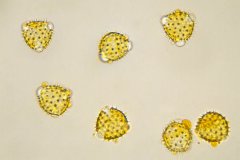Newly published data demonstrate how the Morphologi G3 automated particle characterization system from Malvern Panalytical is being used to examine pollen in support of allergy research. Capable of analyzing thousands of pollen particles in just a few minutes, with little or no user intervention, the Morphologi G3 represents a major breakthrough in allergic disease research. Compared with the manual microscopy techniques traditionally used for pollen purification and characterization, the Morphologi G3 delivers substantial savings in both time and manpower.

The clinical efficacy of allergy diagnostic and immunotherapy products is highly dependent on the composition of the active allergen used as source material. Effective characterization of source material during the manufacturing process is therefore essential. Analyzing pollen samples with the Morphologi G3 allows the automated characterization of pollen in terms of both size and shape. Results enable differentiation between multiple pollen types and, together with the particle images, allow the user to ensure that only the desired pollens are present in a sample. Mixed pollen samples can be further characterized to determine constituent proportions.
At the push of a button the Morphologi G3 analyzes hundreds of thousands of particles, delivering:
- particle shape, particle count and size information
- statistically significant data
- high resolution images of every particle
- full automation
- compliance with 21CFR Part 11
- integrated sample dispersion
Pollen samples were dispersed using the integrated Sample Dispersion Unit, via an instantaneous pulse of compressed air. Standard Operating Procedures defined the instrument's software and hardware settings. . Different types of pollen can be automatically classified based on their size, and shape.
The Morphologi G3 from Malvern